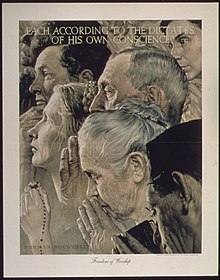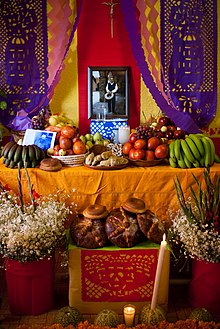Portal:Religion
The Religion Portal
Religion is a range of social-cultural systems, including designated behaviors and practices, morals, beliefs, worldviews, texts, sanctified places, prophecies, ethics, or organizations, that generally relate humanity to supernatural, transcendental, and spiritual elements—although there is no scholarly consensus over what precisely constitutes a religion. Different religions may or may not contain various elements ranging from the divine, sacredness, faith, and a supernatural being or beings. (Full article...)
 Vital article
Vital article
Sunni Islam (/ˈsuːni/; Arabic: أهل السنة, romanized: Ahl as-Sunnah, lit. 'The People of the Sunnah') is the largest branch of Islam, followed by 85–90% of the world's Muslims, and simultaneously the largest religious denomination in the world. Its name comes from the word Sunnah, referring to the tradition of Muhammad. The differences between Sunni and Shia Muslims arose from a disagreement over the succession to Muhammad and subsequently acquired broader political significance, as well as theological and juridical dimensions. According to Sunni traditions, Muhammad left no successor and the participants of the Saqifah event appointed Abu Bakr as the next-in-line (the first caliph). This contrasts with the Shia view, which holds that Muhammad appointed his son-in-law and cousin Ali ibn Abi Talib as his successor. (Full article...)
 Did you know (auto-generated)
Did you know (auto-generated)
- ... that the Grave with the Hands commemorates a married couple, divided by society and religion, with hands clasped over a cemetery wall after death?
- ... that in her 2021 book White Evangelical Racism, professor of religion Anthea Butler called American evangelicalism a pro-Trump, "nationalistic political movement"?
- ... that Freedom of Religion South Africa filed an unsuccessful lawsuit to keep child spanking legal?
- ... that the capital of South Ossetia once had more Jews than Ossetians?
- ... that Gherardo Gambelli, the incoming archbishop of Florence, served as a prison chaplain in Chad for over a decade?
- ... that Gamaliel's principle has been used to support religious pluralism and reforms within religious groups?

Freedom of Worship or Freedom to Worship is the second of the Four Freedoms oil paintings produced by the American artist Norman Rockwell. The series was based on the goals known as the Four Freedoms enunciated by Franklin D. Roosevelt, president of the United States from 1933 to 1945, in his State of the Union Address delivered on January 6, 1941. Rockwell considered this painting and Freedom of Speech the most successful of the series. Freedom of Worship was published in the February 27, 1943, issue of The Saturday Evening Post alongside an essay by philosopher Will Durant. (Full article...)


































































